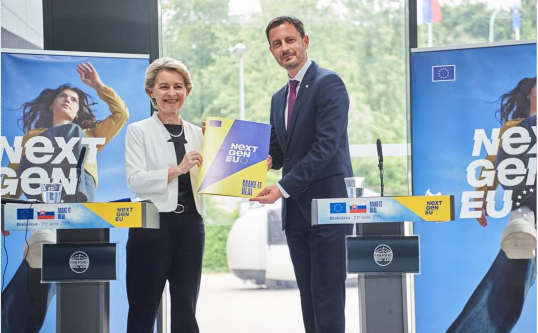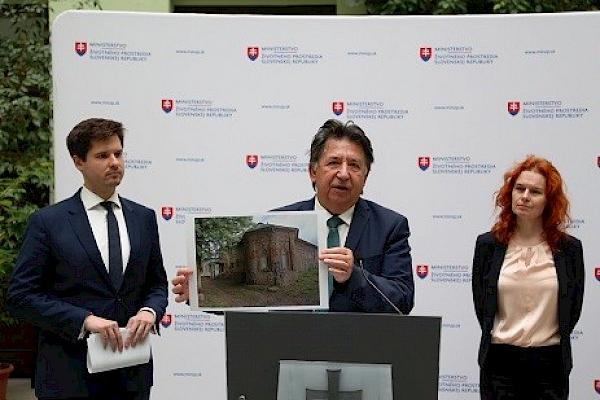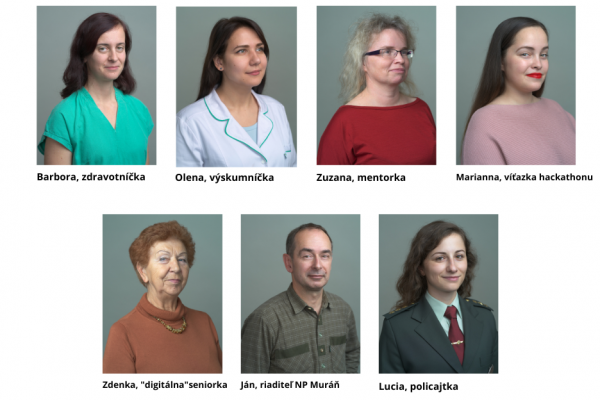
Following the unprecedented crisis caused by the COVID-19 pandemic, Slovakia’s recovery and resilience plan has responded to the urgent need to foster a strong recovery, while making Slovakia’s economy and society more resilient and future ready. In response to the energy market disruption caused by Russia's invasion of Ukraine, the Commission launched the REPowerEU Plan. The Recovery and Resilience Facility is at the heart of its implementation and its funding. Under REPowerEU, EU countries are updating their recovery and resilience plans with new measures to save energy and diversify the EU’s energy supplies.
Green transition
Focusing on green technologies and capacities - sustainable mobility, energy efficiency and renewables, climate change adaptation; circular economy; and biodiversity.
Policies for the next generation
Improving access to and the quality of general, vocational, and higher education; focusing on digital education, early childhood education and care; supporting youth employment.
Smart, sustainable, inclusive growth
promoting entrepreneurship, competitiveness, industrialisation; improving the business environment; fostering research, development and innovation, supporting small- and medium-sized businesses.
Digital transformation
Promoting the roll-out of very high-capacity networks, the digitalisation of public services, government processes, and businesses, in particular SMEs; developing basic and advanced digital skills; supporting digital-related R&D and the deployment of advanced technologies.
Social and territorial cohesion
Improving social and territorial infrastructure and services, including social protection and welfare systems, the inclusion of disadvantaged groups; supporting employment and skills development; creating high-quality, stable jobs.
Health and economic, social and institutional resilience
Improving the resilience, accessibility and quality of health and long-term care, including measures to advance their digitalisation; increasing the effectiveness of public administration systems.
The map exclusively serves information purposes and is not an exhaustive database of projects supported by the Recovery and Resilience Facility. It does not reflect the distribution of the projects funded by the Recovery and Resilience Facility across the European Union, nor across different geographical areas or sectors within EU Member States. The RRF funding amounts shown for measures are based on the initial cost estimates included in the recovery and resilience plans.
Furthermore, the projects showcased are without prejudice to any future assessment by the Commission in the context of verifying the satisfactory fulfilment of milestones and targets under Regulation (EU) 2021/241 establishing the Recovery and Resilience Facility.
Country snapshot

The country snapshot illustrates some of the most iconic and impactful projects included in the Slovak Recovery and Resilience Plan that will bring positive change for EU citizens, businesses and the EU at large.
The reforms and investments in Slovakia’s plan are helping it become more sustainable, resilient and better prepared for the challenges and opportunities offered by the green and digital transitions. Following Council approval of Slovakia’s plan on 13 July 2021, Slovakia’s recovery and resilience plan was updated on 14 July 2023 to also introduce reforms and investments that address REPowerEU objectives.
*The plan is entirely financed by RRF grants.
** This value includes the transfer from the Brexit adjustment reserve requested by Slovakia and Slovakia’s REPowerEU grant.
- 64 investment streams and 70 reforms
- 46% of the plan will support climate objectives
- 21% of the plan will foster the digital transition.
The transformative impact of the Slovak plan is the result of a strong combination of reforms and investments which address the country’s specific challenges. The reforms address in particular the bottlenecks to a lasting and sustainable growth. The investments are targeted to accelerate the transition towards a more sustainable, low-carbon and resilient economy, to facilitate the digital transformation of businesses and the society and to reinforce social resilience by improving quality of education and healthcare systems.
All measures have to be implemented within a tight time frame, as the Regulation establishing the Recovery and Resilience Facility requires all milestones and targets within the national plans to be completed by August 2026.
REPowerEU measures in Slovakia’s plan
Slovakia’s plan now includes six new reforms, four new investments with four existing investments receiving additional funding to reduce its reliance on fossil fuels, in line with the REPowerEU Plan's objectives.
To finance this increased ambition, Slovakia has asked for a share of its Brexit Adjustment Reserve to be transferred to the plan, amounting to 36.7 million. These funds would be added to Slovakia's REPowerEU grant of €366.4 million.
Key measures for REPowerEU
The objective of the REPowerEU component of the Slovak recovery and resilience plan is to reduce the overall dependence on fossil fuels imports from Russia, increase energy security and accelerate the transition to renewables.
In particular, investments in energy infrastructure, together with measures on permitting processes, energy efficiency of buildings, zero-emission transport and the promotion of green skills, are expected to contribute to reducing the reliance on fossil fuels and integrating renewables into the Slovak energy mix faster and more widely.
Of the 14 measures in the Slovak REPowerEU chapter, eight have a cross-border dimension.
The objective of investment 1 of the REPowerEU chapter is to contribute to the modernisation and digitalisation of the electricity networks in Slovakia with the aim of upgrading 250 km of transmission lines in order to maintain the transmission of electricity generated by renewables across Europe. In particular, it aims to accommodate the expected increase in intermittent renewables. The investment responds to the need to create new capacities for connecting new renewable energy sources to the grid – for electricity production, storage facilities, aggregators as well as for energy communities. The increase of the transmission capacity is also expected to allow for increased electricity trade with neighbouring Member States to make better use of electricity from renewable sources.
Green transition
In the area of climate and environmental policies, Slovakia’s challenges include the transition towards a greener energy mix, more sustainable mobility, better energy and environmental performance of buildings, increased biodiversity protection, adaptation to climate change and development of the circular economy.
Key measures for the green transition
- The plan supports the green transition through an investment of €446,5 million for a large-scale renovation to make at least 25 164 family houses more energy efficient.
- Investment of around €368 million into the decarbonisation of industry will spur energy efficiency improvements and deployment of innovative technologies.
- €759.3 million will be invested into sustainable transport to support the roll-out of more than 3000 charging stations for alternative fuels, the modernisation of railways and 162 km of new cycling infrastructure.
- This investment will be further enhanced by a comprehensive reform creating integrated public transport systems in six regions.
- Measures for climate change adaptation will combine investments of nearly €150 million with reforms in the area of nature protection, water management and landscape planning to preserve biodiversity. The investment will result in 90 km renatured watercourses and the promotion of a more sustainable local economy.
The modified plan, including the REPowerEU chapter, has further strengthened the focus on the plan on the green transition, devoting dedicating 46% of the available funds to measures that support climate objectives (up from 43% in the original plan).

The investment supports green projects in the national parks of Muránska Planina and Poloniny. This is linked to the reform of natural conservation and revitalisation of the countryside.
- Project locations
- Slovakia
Digital transition
Slovakia´s performance in the digital ranking of EU Member States remains weak. Slovakia faces challenges related to a low level of digitalisation of public administration and public services, slow uptake of digital technologies, insufficient digital skills, and gaps in broadband coverage and the deployment of 5G.
Key measures for the digital transition
- The plan supports the digital transition with reforms and investments supporting digitalisation of the public administration, including areas like education, healthcare and justice.
- With an investment of €177.5 million, the plan aims at providing better services for citizens and businesses by introducing user-friendly e-government solutions.
- An investment of around €85 million will help businesses with their digitalisation through a network of digital innovation hubs to assist them in digitalising business processes and provide trainings in digital skills.
- Investments will support the development of a new Slovak supercomputer and participation in other cross-border EU projects.
- Quality and digitalisation of schools will be supported through €187 million to finance digital equipment, including for children from socially disadvantaged backgrounds, to enhance digital skills and create a new learning ecosystem, which will be further strengthened by an essential curriculum reform.

The objective of this investment is to support the development of new learning curricula, to be introduced in primary and lower-secondary levels of education as of the school year 2023 (39 pilot schools have started implementing the reform in 2023 on a voluntary basis) and in all primary schools...
- Project locations
- Slovakia
Economic and social resilience
Key socio-economic challenges for the Slovak economy include poor education outcomes and skills of pupils - in particular from a socially disadvantaged background – and low enrolment rate of children in pre-school facilities. Slovakia’s health outcomes are weak and life expectancy is among the lowest in the EU. Slovakia´s ability to increase competitiveness and productivity requires improving innovation and promoting sectoral diversification, but the low quality of public research and limited cooperation with businesses constrain the transfer of knowledge and skills. Public administration and the business environment suffer from administrative complexity and systemic inefficiencies. These challenges weigh on potential growth and employment.
Key measures in reinforcing economic and social resilience
- The plan reinforces economic and social resilience with measures fostering inclusive education systems at all levels.
- It will improve the access to and the quality of the inpatient and outpatient health care and enhance long-term care services.
- The modernisation of the hospital network should help increase the quality and cost-effectiveness of medical services, while ensuring fair geographical distribution and accessibility.
- This will be combined with investments aimed at improving the accessibility of primary care services in underserved regions. Significant infrastructure investments will be in particular targeted at modernisation of hospital buildings (€930 million) and increasing capacities of pre-school facilities (€141 million).
- Enhancing social and health care capacities will combine a reform and investments of around €246.5 million for those in need through community- based solutions.
- To support innovation potential, the plan intends to reform RDI governance and invests around € 575.2 million into support schemes to mobilise excellent researchers and projects, public-private research cooperation, injecting new capital and microloans to companies and providing innovation vouchers to SMEs.
- The plan includes a reform to improve the business environment by accelerating public procurement and reforming the insolvency framework to reduce the time and cost for running a business.
- Reorganisation of the justice system combines a reform to improve efficiency and independence and investments of €232.7 million into the infrastructure of courts and digitalisation.
The healthcare reform aims at creating a modern, accessible and high-quality hospital network, which introduces five levels of hospital care and establishes a minimum number of mandatory medical services for individual hospitals.
- Project locations
- Slovakia
ANNUAL EVENT
- The 2022 Annual Event on Slovakia’s recovery and resilience plan took place on 8 December 2022.
- Participants included the European Commission, Government of Slovakia, and a broad range of stakeholders, including social partners, NGOs, representatives of local and regional authorities, academics and others.
- The discussions focused on the implementation of Slovakia’s recovery and resilience plan in the areas of the financing green transition and supporting innovation and human capital as well as the challenges identified in the European Semester process.
EUROPEAN SEMESTER
Slovakia’s plan is consistent with the challenges and priorities identified in the European Semester, the annual cycle of coordination and monitoring of each EU country’s economic policies. For a detailed explanation of the European Semester see the following link: The European Semester explained | European Commission (europa.eu)
National recovery and resilience website
Original Recovery and Resilience Plan (July 2021)
National recovery and resilience plan - submission 2021
Updated Recovery and Resilience Plan (July 2023)
Original Recovery and Resilience Plan (July 2021)
Documents
Council Implementing Decision on the approval of the assessment of the recovery and resilience plan of Slovakia(corrigendum) and Annex
Commission Staff Working Document: Analysis of the recovery and resilience plan of Slovakia
Press Material
Press release: "European Commission endorses Slovakia's plan"
Factsheet: Slovakia’s recovery and resilience plan
Questions and answers: European Commission endorses Slovakia's plan
Further Information
Presentation to the Council of Slovakia’s recovery and resilience plan
Summary of the assessment of the Slovak recovery and resilience plan
Updated Recovery and Resilience Plan (July 2023)
Documents
Press Material
Press release: Commission endorses Slovakia's €6.4 billion modified plan
Pre-financing
Press release: Commission disburses €822.7 million in pre-financing to Slovakia
First Payment Request
Documents
Preliminary assessment of the first payment of Slovakia
Commission implementing Decision on the authorisation of the first disbursement to Slovakia
Press Material
Questions and answers on Slovakia's first payment request
Daily News: Commission disburses first payment to Slovakia
Second Payment Request
Documents
Preliminary assessment of the second payment request of Slovakia
Commission implementing Decision on the authorisation of the second disbursement to Slovakia
Press Material
Questions and Answers on Slovakia's second disbursement request under NextGenerationEU
Daily News: Commission disburses second payment to Slovakia
Third Payment Request
Documents
Preliminary assessment of the third payment request of Slovakia
Press Material

